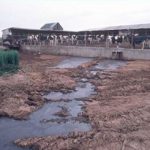The Environmental Working Group wants you to eat less meat. Why?
To save the planet, of course!
The EWG believes that meat production leads to some major environmental health issues, such as water and soil pollution, greenhouse gases, and a hefty carbon footprint. Their new Meat Eater’s Guide to Climate Change and Health says that the millions of pounds of chemical fertilizer and pesticides used to grow feed (read: GMO corn and soy) for the animals, and 500 million tons of toxic manure are part of what makes meat production bad news for the future of our planet.
But, wait a second. That all sounds familiar. Isn’t that what CAFO production does?
Isn’t grassfed meat production healthy and sustainable, and free of all those environmental consequences?
Not according to the EWG. They report that because “…a few studies of the impact on climate show mixed results for grass-fed versus confined-feedlot meat,” there isn’t enough evidence to support a major difference between the environmental impact of the two. So, instead, they lump them together and claim that all meat poses serious environmental threats.
The EWG does admit that choosing local, grass-fed meat is the better choice for both the environment and your health, but fails to report accurate distinctions and advantages that sustainable meat production has over the bad guys.
Real Meat is Not Environmentally Damaging
After discovering this “breaking news” (as EWG calls it) I wanted to consult Stanley A. Fishman, an author, blogger, attorney, and nutrition researcher who literally wrote the book on grassfed meat*, on what he had to say about the EWG’s findings. We chatted about the subject on Facebook, and Stanley has allowed me to share his take on these misleading claims (emphasis mine):
“First, grass eating animals renew the soil, making it fertile for trees and plants, such as grasses. When they are allowed to graze in a natural herd, they eat the older growth, break up the soil, and fertilize the earth with their manure. Eating the older growth allows new plants to flourish, breaking up the soil is like a natural plowing, driving seeds deep into the earth, and grassfed manure is the best fertilizer. With proper grazing rotation, the earth rests and renews itself until the herds come again, to start the whole cycle.
Allen Savoury, the founder of holistic land management, developed a whole process for doing this, and his principles were able to turn a huge amount of african desert into fertile grasslands, causing rivers and streams to come back. Grassfed herds can reverse desertification. Everybody knows that grass and trees and water are good for the planet. In fact, most of the good farmland we have today was created by grazing animals.
The idea that grass eating animals create warming goes against history. Long before humanity had any ability to impact the climate, there were huge herds of grass eating animals, many more than exist today. That is what created the great plains and fertile farmlands of the world. The great grasslands and forests that depended on this herd-created soil were very good for the planet.
I do not find studies created about meat by a group promoting vegetarianism to be convincing. Even if you look only at what the animals eat, grassfed is far superior. Huge amounts of fuel and artificial fertilizer are used to grow and transport the grains eaten by feedlot beet, while none of this is needed for grassfed.” -Stanley A. Fishman, author of Tender Grassfed Meat
The Meat Eater’s Guide outlines various “Climate Impacts” associated with meat production — none of which equally apply to sustainably-farmed meat. Their list states the following environmental offenders in regards to meat production:
- Digestion-Generated Methane: Yes, the methane released during a ruminant’s enteric-fermenting digestive process is a more potent gas than carbon dioxide. But guess what? Grassfed herds generate fertile soil for vegetation which consume CO2 and act as nature’s air filter, offsetting the effects of the greenhouse gases produced. (The EWG again, admits this, yet continue to blast their anti-meat propaganda as though facts like these, which support the differences in grassfed vs. feedlot, don’t exist.)
- Feed Production: The fuel, pesticides, and fertilizer required to produce feedlot corn and soy obviously do not apply to grassfed meat production. Additionally, the amount of water needed for grassfed herds is drastically less than what is used for CAFO feed production.
- Manure: Those millions of tons of toxic feedlot manure seeping into the water supply and polluting the air aren’t found on a sustainable meat farm. Manure from grassfed herds is not only lacking a multitude of toxic compounds found in feedlot manure, but naturally fertilizes and replenishes the grass and soil, and can be used for other organic farming.
- Processing: Factory slaughterhouses do indeed account for some of the worst industrial polluters, but again, with small-scale, sustainable meat production, this doesn’t apply.
- Waste: EWG states that “20% of all edible meat ends up in landfills.” And why exactly are we blaming that on the meat? This is simply due to irresponsible consumers practicing unsustainable home management.
But the half-truths the EWG presents don’t end here.
Real Meat is NOT Unhealthy
“On the health front, the scientific evidence is increasingly clear that eating too much of these greenhouse gas-intensive meats boosts exposure to toxins and increases the risk of a wide variety of serious health problems, including heart disease, certain cancers, obesity and, in some studies, diabetes…. We can improve our health, shrink our waistlines, and even extend our lives by eating more vegetables and less meat. ” –EWG
*gasp!*
Oh-ho NO you DI’NT, EWG!
This is one blatant lie I will NOT let you go spreading to health-conscious consumers. More veggies? Yeah, fine. But to claim that eating less meat is a proven way to avoid serious health problems is inexcusably misleading.
Once again, there is an enormous difference between those “greenhouse gas-intensive” toxic CAFO meats, and real, healthy, grassfed meat, and how the body responds to each.
Our meat expert, Stanley, explains that to assume all meats are created equal in scientific studies, is flawed reasoning:
“I have read study after study about meat. And one crucial fact emerges—nearly all of these studies treat all meat, whether raised with or without artificial hormones, raised with or without subtherapeutic antibiotics, fed their natural diet or an artificial one, fresh, or heavily processed meats loaded with preservatives and artificial chemicals, as being the same for the purposes of the study.
I have always found the assumption that all meat is the same to be flawed. This assumption makes it impossible to tell if the results are caused by the meat or by the chemicals, hormones, antibiotics, and preservatives added to some of the meat.
A key illustration in distinguishing real meat in such studies was found:
“Two Swedish studies have shown how vital this detail is. The first study, done on Swedish women, treated all meat as being the same, and found that eating “meat” increased the risk of stroke. This study was heavily publicized by the Reuters news agency.
The second study, done on Swedish men, differentiated between fresh meat and processed meats. This study found that fresh meat made no difference in the risk of stroke. This study also found that eating meats processed with chemicals and preservatives did increase the risk of stroke, as shown in this article.
The conclusion I draw from these studies is that it is the chemicals and preservatives added to processed meats that are to blame for the increased stroke risk, not the meat itself.”
The EWG goes on to make further claims against the consumption of meat:
“Americans consume far more meat than needed to get their recommended amount of daily protein — adult men, on average, get twice as much protein as they need. In 2009, the US produced 208 pounds of meat per person for domestic consumption — nearly 60% more than Europe. The evidence is clear that eating too much meat — particularly red and processed meats — is associated with serious health problems.”
I won’t deny that Americans are eating too much processed meat (it’s because they’re not eating enough other things, like real produce, real fats, real food!). But to imply that eating an animal-based diet is unhealthy really misses the mark.
Again from Stanley Fishman:
“I am aware of only one study that reviews the effect of grassfed meats on human health, but that study is the most extensive ever done. Dr. Weston A. Price studied traditional peoples eating the diets of their ancestors. Dr. Price actually visited every people he studied. The study lasted ten years, and is described in detail in Dr. Price’s magnificent book, Nutrition and Physical Degeneration. Dr. Price did not let bias interfere with his analysis—a very spiritual man, he had hoped and expected that these healthy peoples would be vegetarian, but faithfully reported the fact that they thrived on animal foods.
Most of the peoples studied by Dr. Price ate plenty of meat and fat as part of their traditional diet. The meat was grassfed or wild. No chemicals. None of these people had cancer, or heart disease, or stroke, or any of the chronic diseases that plague modern society.” – When it Comes to Meat, Study the Studies First
To make matters worse, the EWG points out in their recommendations for choosing healthy meat products, as well as cheese and other dairy, that we ought to choose “lean cuts” of meat and “lower-fat” dairy products.
Hopefully, you’re already well-aware of what a crock the anti-saturated-fat manifesto is, and understand that low-fat dairy is fake, unhealthy non-food, and one that comes from CAFOs, no less! The EWG seems to be just another jumper on the falsified USDA bandwagon which aims to steer the American public against traditional diets, and encourage consumption of more highly-processed foods.
“Meatless Mondays:” Let’s Put a Part-time Boycott on Food, and Call That Responsibility
As it’s new Guide explains, the EWG is now a big promoter for the “Meatless Mondays” movement, in which consumers are discouraged from consuming any meat or cheese one day a week, in the name of positively impacting climate change.
This is NOT the right way to address the environmental crisis.
The connection between meat production and environmental damage only exists with factory farming.
The goal needs to be reversing the buying habits of the public: stop buying CAFO-produced food products and start (and continue) to buy only sustainably-farmed products, so that those farms can thrive in these difficult times, with our support. Buying grassfed needs to be portrayed not as the better choice, but the only choice.
This idea that meat should be abstained from, even partially, goes against supporting the movement to preserve sustainable agriculture.
If you have access to local, grass-fed meat — by all means, buy as much of it as you can afford! It’s healthy not only for you, but for sustaining farm-based agriculture.
Your local farmer needs your food dollars. But if it isn’t in the budget to put local, grass-fed meat on the table every night of the week, then of course, cooking more frugal, meat-free fare would be wise, and necessary. My point is that to partially boycott all meat (including real, grassfed meat) simply out of concern for the environment and your own health, as the EWG wants you to do, is senseless and an irresponsible action against sustainable farms.
The EWG says that local, grassfed meat is “expensive and difficult to find.” It’s up to us to change that by not giving one more dime to government-subsidized and artificially-priced CAFO products, and instead supporting the growth of sustainable agriculture.
Stand Up for Your Steak
The EWG has done so many great things for environmentally-concerned and health-conscious consumers. They give us the Dirty Dozen and the Clean Fifteen, a very helpful guide toward picking healthy produce untainted by chemical fertilizers and pesticides. They influence our buying choices with their Skin Deep Cosmetics Database, which educates us about toxicity levels in personal care products. They’ve done huge amounts of work and research to expose threats to the environment and our health, and they are to be commended for much of that.
But clearly, their new advice to the public regarding the impacts of meat consumption is misguided and unbalanced. If there’s one thing I’ve learned from this, it’s that even a trusted source of knowledge can skew the facts to support a biased viewpoint, and, well — you really can’t believe everything you read on the internet, can you?
Will you also be dismissing the EWG’s Meat Eater’s Guide? Why or why not? I’d love to hear your thoughts in the comments below.
Additional Resources:
*Please check out our friend Stanley’s site where you can purchase Tender Grassfed Meat, a book that thoroughly examines and highlights the many great benefits of real, healthful meat — complete with recipes, preparation techniques, and more!
{This post is linked to Traditional Tuesdays!}





I love the way everything in nature works together in a cycle to be ultimately beneficial (like the digestion-generated methane which actually fertilizes the soil to create more vegetation, which in turn consumes more CO2 & filters the air). God is seriously brilliant to create things that way! It’s when people get in there and think they can “improve” things that we end up with problems like this.
Keep (grassfed) meat on the plate! 🙂
AMEN! So, so true.
The way we were intended to eat – so sad that it’s become such a foreign concept in our society today. Wake up, EWG!
You go Girl!!
Woop woop! Haha thanks, Molly! 🙂
So glad to see someone else was as upset about this EWG report as I was!
I love your post – there needs to be more understanding about true grass-fed meat vs feed lot meat as far has health is concerned.
I only have promoted a meatless day for financial reasons and I would still allow pastured eggs or cheese for us – I think truly vegan is not healthy long-term (and as expensive as some of the meat replacements are, you might as well the real thing).
Fortunately I now live in AK with a lot of hunters so we get to eat ‘free range’ moose, caribou, and bison!